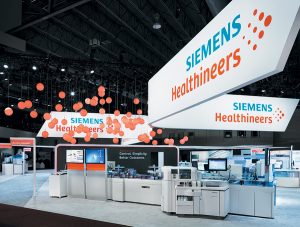As one of the largest health tech providers in the world, Siemens Healthineers is a ground-breaking industry leader serving an estimated 5 million patients every day. With offerings ranging from medical imaging, to laboratory diagnostics, and medical information technology, the German-based company’s products are trusted by 90 percent of the top 100 global health providers.
According to Evaluate MedTech’s analysis, world sales for health technology are predicted to reach $522 billion by 2022, and diagnostic imaging is expected to take $48 billion of that market pie. Siemens holds a sizable share in the sector and spends approximately $1.4 billion on research and development. From the first industrially manufactured medical x-ray unit it introduced in 1896, Siemens has been leading the charge on innovation in diagnostic imaging.
Most recently, Siemens Healthineers unveiled two new AI-powered software assistants for MRI – its AI-Rad Companion Brain MR for Morphometry Analysis and AI-Rad Companion Prostate MR for Biopsy Support – at this year’s Radiological Society of North America (RSNA 2019) in Chicago.
Created as trusty tech-companions to radiologists, the solutions are capable of taking on some of the routine work while conducting magnetic resonance imaging exams of the brain and prostate. According to Siemens’, the Brain MR tool performs “automatic segmentation of MRI images of the brain and measures brain volume.” A reduction in the brain volume reveals potential diseases such as Parkinson's, Alzheimer's, and other dementia-related diseases.
The software automatically identifies nearly 50 brain segments on MRI images and then compares the results against a normative reference database for brain morphometric, provided by the Alzheimer’s Disease Neuroimaging Initiative (ADNI). After the analysis is completed, the Brain MR tool feeds the data into a report with deviations in volume earmarked for the neurologist to examine.
Like its cerebral counterpart, the Prostate MR completes a similar automatic segmentation process on the outer contour of the prostate. The software assistant helps radiologists identify areas suspected of having lesions. From there, radiologists can pass on the imaging information to urologists for integration with ultrasound images carried out during biopsy.
“With the new AI-based assistants, we are expanding our diagnostic offering to help our customers increase efficiency and improve the quality of care,” said Peter Koerte, head of digital health for Siemens Healthineers.
“We firmly believe that AI will help physicians deal with their workload and benefit patients by helping achieve an improved, patient-focused decision-making process.”
As an organization, the x-ray machine and scanner manufacturer is majority-owned by Siemens AG. In March 2018, a 15 percent stake of Healthineers was listed on the Frankfurt Exchange and became the second-largest IPO in Germany’s last two decades. It employs an estimated 50,000 people spanning 70 countries and holds 18,500 patents globally.
























